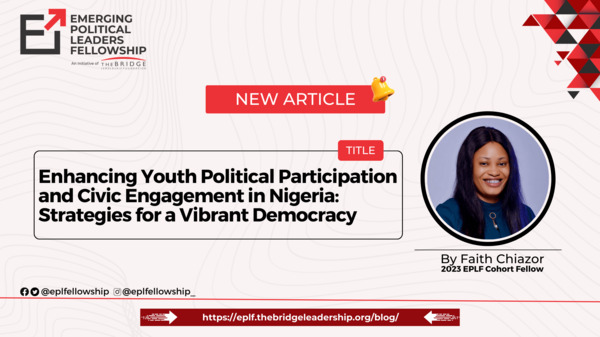By Faith Chiazor, EPLF Fellow 2023 Cohort
Nigeria, often hailed as the “Giant of Africa,” is a nation with immense potential. As a significant player on the global stage, Nigeria stands at a critical juncture in its democratic journey. With approximately 60% of its population under 35, it is no gainsaying that at the heart of a thriving democracy lies in its youth political participation and civic engagement. However, Nigeria’s democratic landscape has been an area of concern, as youth involvement has been alarmingly low, especially in actual party politics, which is the ground structure of political participation. They face an uphill battle regarding political participation, such as the widespread political apathy fueled by disillusionment with the current system. Youth often feel marginalized and disconnected from the political establishment, leading them to disengage from the political process. Also, the exorbitant cost of political campaigns prevents aspiring young leaders from contesting for office, creating an unfair barrier to entry for those eager to contribute positively to governance, hence stifling fresh perspectives and innovative ideas. I feel safe to term this situation as ‘not-too-young-to-run, but too-broke-to-contest”. Additionally, political violence and the prevalence of electoral malpractices have eroded trust in the political system, further alienating young people from participating in the democratic process.
Overcoming these challenges can yield transformative benefits in Nigeria. One pivotal advantage lies in integrating youths’ unique perspectives, experiences, and concerns into decision-making processes. This diversity of input fosters more inclusive policies that cater to the needs of all population segments, leading to a more equitable and just society. Similarly, youth participation nurtures a sense of responsibility and citizenship among young Nigerians. When youths feel valued as stakeholders in the nation’s political landscape, they become more invested in tackling its challenges and actively work towards sustainable solutions. This heightened sense of civic duty can foster a decline in apathy and ignite a culture of active citizenship, where young people become catalysts for positive change in their communities.
To pave the way for a vibrant democracy, concerted efforts must be made to bolster youth political participation and civic engagement. A foundational strategy involves creating and supporting mentorship programs, which can be a powerful tool in guiding aspiring young politicians and change-makers. These mentorship initiatives offer valuable insights into the complexities and opportunities of politics and empower young Nigerians with the knowledge and confidence to navigate the political landscape effectively. To address financial barriers to political participation, the government should introduce more pro-youth reforms to regulate campaign spending and promote transparent funding sources. By leveling the playing field, more youths will be encouraged to participate, knowing that financial constraints will not be an insurmountable barrier to their ambitions, as the case is today. This will provide opportunities for fresh voices to contribute to the nation’s development. In addition, leveraging technology and social media can play a pivotal role in enhancing youth political engagement. Social media platforms provide an ideal space to connect, organize, and raise awareness about political issues. Political leaders and organizations can utilize these platforms to engage with young citizens and solicit feedback, making the political process more accessible and interactive for youths.
In summation, embracing youths’ energy and creativity can unlock Nigeria’s potential and usher in an era of inclusive policies and accountable leadership. A vibrant democracy, with youths at its core, will pave the way for a prosperous, harmonious, and sustainable future for Nigeria.


Comments (2)
Amazing content.
Great recommendations.
Our population as youth should be a strength to explore. One major thing we need to do is to harness our capacities and form a robust alliance across boards. We can influence the system and gradually take over not just in politics but in other spheres of life. If you ask me, I would say we are already commanding attention. We just need to consolidate our existing drive.
Comments are closed.